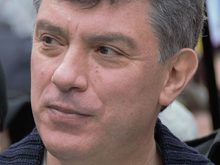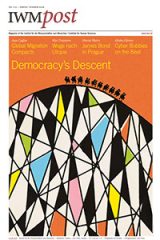

In collaboration with
Institute for Human Sciences
The Institute for Human Sciences / Institut für die Wissenschaften vom Menschen (IWM) is an independent institute for advanced study in the humanities and social sciences. Since its foundation in 1982, it has hosted more than 1500 scholars, journalists and translators from all over the world. Many of the Institute’s Permanent and Visiting Fellows are regular contributors to Eurozine or its focal points The World in Pieces and Ukraine in European Dialogue (see below).
Website: www.iwm.at
Twitter: @IWM_Vienna
Youtube: IWMVienna

Articles

The situation for women in societies caught up in the post-’89 transition is complicated, writes Slavenka Drakulic. On the one hand, they now stand to lose rights that were, at least formally, established during the communist regime. On the other, women’s position in society has been undermined everywhere in Europe – in East and West alike. The financial crisis has struck hard, and women have been struck harder.

In the wake of the technological revolution that is the Internet, writes Ilija Trojanow, principles of self-organization and collaboration might be expected to replace established hierarchies and concentrations of power. Instead, the technologies of surveillance now available to states have never been more intrusive.

Russian responses to the Charlie Hebdo attack in Paris reveal the contradictions of political and social trends in today’s Russia, writes Nikolay Mitrokhin; with the most dramatic response being the unprecedented political killing of leading opposition politician Boris Nemtsov.
In 2013, the seemingly hopeless task of bringing art to the provinces finally started to bear fruit in Luhansk, eastern Ukraine. One year on, the activists, artists, journalists and writers responsible are exiles in their own country, writes Konstantin Skorkin.
Focal points

Inspired by a lecture that Clifford Geertz delivered in 1995 at the Institute for Human Sciences in Vienna, this focal point engages with ‘deep diversity’, ‘a sense of dispersion, of particularity, of complexity and of uncenteredness’ rather than unified world order. It follows the launch of a research programme of the same name at the institute in January 2023.

Post-revolutionary Ukrainian society displays a unique mix of hope, enthusiasm, social creativity, collective trauma of war, radicalism and disillusionment. With the Maidan becoming history, the focal point ‘Ukraine in European Dialogue’ explores the new challenges facing the young democracy, its place in Europe, and the lessons it might offer for the future of the European project.
Projects and publications

